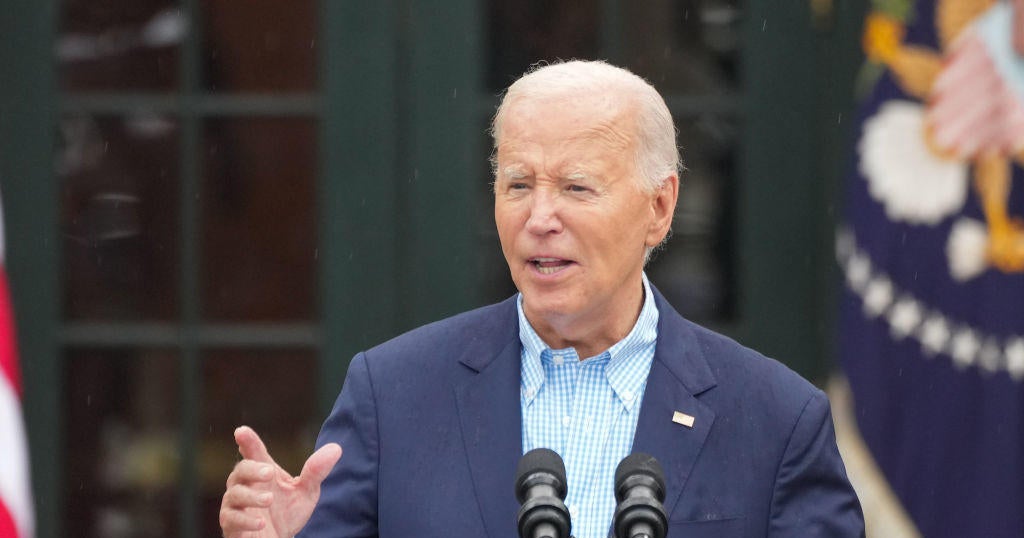CBS News
Biden heads to Wisconsin to kick off critical weekend for 2024 campaign

Washington — President Biden is set to travel to the battleground state of Wisconsin on Friday for a campaign rally, marking the start of a crucial weekend for his reelection bid as he seeks to assuage concerns about his fitness for a second term sparked by his startling debate performance just over one week ago.
In addition to the campaign event in Madison, Wisconsin, on Friday afternoon, Mr. Biden will tape an interview with ABC’s George Stephanopoulos, which the network said will air in full Friday night. The president will also head to Philadelphia for another campaign event on Sunday, capping the July 4 holiday weekend with a visit to a second battleground state.
The president’s appearances are coming under new scrutiny following his poor showing against former President Donald Trump, the presumptive Republican nominee, in the first general election debate on June 27. Mr. Biden blamed his performance on a busy travel schedule leading up to the face-off with Trump, saying during a campaign event Tuesday that he “almost fell asleep” on stage after making two trips to Europe in June.
In a pair of radio interviews that aired Thursday, Mr. Biden admitted he had a “bad debate” and that he “screwed up.”
Mr. Biden’s campaign and the White House sought to brush off concerns about his lackluster performance by insisting he had a cold and that the debate fiasco was simply a “bad night.” As part of efforts to quiet concerns about Mr. Biden and his age, he and Vice President Kamala Harris participated in a call with campaign staff on Wednesday, and they met with 20 Democratic governors at the White House later that evening. Mr. Biden also spoke with the Democratic leaders of the House and Senate, as well as other key allies on Capitol Hill.
The president has maintained the same message throughout the outreach, according to participants: he is in the race to defeat Trump and will not be pushed out.
“I learned from my father, when you get knocked down, just get back up, get back up,” Mr. Biden told “The Earl Ingram Show,” which airs in Wisconsin, in the radio interview Thursday. “And you know we’re going to win this election, we’re going to just beat Donald Trump.”
Amid the assurances, two House Democrats have openly called on Mr. Biden to withdraw from the presidential race: Reps. Lloyd Doggett of Texas and Raúl Grijalva of Arizona. Others, meanwhile, have publicly urged the president to take steps to prove to voters, elected Democrats and party donors that he is fit for a second term in the White House.
CBS News
Capybaras are the “it” animal inspiration for toys, slippers and T-shirts this holiday season

The world’s largest rodent is having a big moment.
The capybara — a semi-aquatic South American relative of the guinea pig — is the latest in a long line of “it” animals to get star treatment during the holiday shopping season.
Shoppers can find capybara slippers, purses, robes and bath bombs. There are cuddly plush capybaras and stretchy or squishy ones. Tiny capybaras wander across bedding, T-shirts, phone cases, mugs, key chains, crochet patterns and almost any other type of traditional gift item. Last year, it was the axolotl that took pride of place on many products, and the endangered amphibian remains popular. Owls, hedgehogs, foxes and sloths also had recent turns in the spotlight.
Trendy animals and animal-like creatures aren’t a new retail phenomenon; think the talking Teddy Ruxpin toys of the 1980s or Furby and Beanie Babies a decade later. But industry experts say social media is amplifying which animals are hot — or not.
© Liudmyla Konkina @LudovicToys on Etsy; Liudmyla Konkina’s Ravelry Story
“It’s really the launch on TikTok, Instagram and other social media platforms that allow these characters or animals to blow up like crazy,” said Richard Derr, who has owned a Learning Express Toys franchise in Lake Zurich, Ill., for nearly 30 years and is also a regional manager for the specialty toy store chain.
Social media is also speeding up the cycle. Must-have animals may only last a season before something new captures customers’ imaginations.
“It’s really important to keep feeding that beast,” Juli Lennett, a vice president and toy industry advisor at market research firm Circana, said. “If you are an influencer, you’re not going to talk about last year’s stuff.”
Skyrocketing plush toy sales — fueled by a need for comfort during the pandemic — are also increasing the demand for new and interesting varieties, Lennett said. In the first nine months of this year, sales of plush animals were up 115% from the same period in 2019, she said. Overall toy sales rose 38% in that time.
/ Getty Images
Consumers are seeking out increasingly exotic species that they see in online videos, games and movies. Highland cows, red pandas and axolotls, a type of salamander native to Mexico, have all popped up in popular culture. According to Google Trends, searches for axolotls shot up in June 2021 after Minecraft added them to its game.
“Nobody knew what an axolotl was in 2020,” Derr said. “Now, everybody knows axolotls.”
Cassandra Clayton, a Vermont Teddy Bear Company product designer, said rising sales to adults are also fueling the demand for unique – and collectible – plush toys.
“Stuffed animals are really becoming an ageless item,” she said. “Especially with the boom of self-care in adults and turning towards comfort objects to help de-stress and relax in your life.”
Clayton expects demand for unusual stuffed animals to continue to grow. Among the oddest she has seen: a stuffed version of a water bear, a type of microorganism also known as a moss piglet or a tardigrade.
“It doesn’t necessarily inspire you to cuddle with them, but you’re really seeing the industry start turning towards those characters,” she said. “I think that’s the next trend.”
Figuring out the next “it” animal — or microorganism — is a challenge for toy makers.
“You never know exactly when they’re going to hit and how big they’re going to be,” said Sharon Price John, the president and CEO of Build-A-Bear Workshop, a chain of nearly 500 stores that offers an expanding menagerie of animals and characters for customers to customize, including capybaras and axolotls.
Jeff Roberson / AP
The St. Louis-based company watches social media and gets ideas from talking to store employees and patrons, John said. It usually takes Build-A-Bear up to a year to introduce a new stuffed toy, she said, but the company can move faster if it spots a trend. It sometimes tests a small batch online to make sure a trend is sticking, John said.
Annual trade shows in Asia, Germany and elsewhere are another place to spot new trends. Punirunes – digital, interactive pets that also come in plush varieties – are big in Japan right now and will likely take off in the U.S., toy store owner Derr said.
“Here, I can’t give them away. They’re too new. But give it a year or two,” he said.
Companies can kick off their own trends too. Build-A-Bear’s Spring Green Frog, introduced in 2020, was an immediate hit thanks to videos posted by customers. It remains popular, with nearly 2 million sold, John said.
John suspects people are drawn to friendly, slow-moving capybaras because watching videos of them are so relaxing. But shoppers who want one need to act fast. A Build-A-Bear holiday capybara with red and green sprinkles on its fur – dubbed a “cookiebara” – has already sold out, she said.
___
Durbin reported from Detroit. Crawford reported from Lake Zurich, Ill.
CBS News
Government shutdown looking more likely after spending bill tanked

Watch CBS News
Be the first to know
Get browser notifications for breaking news, live events, and exclusive reporting.
CBS News
Trump shakes up spending talks with call on Congress to eliminate debt ceiling

In a move that has stunned Washington, President-elect Donald Trump is now urging Congress to eliminate the debt ceiling, dramatically shaking up talks among lawmakers, who are at an impasse over federal spending and government funding, which is scheduled to lapse this weekend.
While some on Capitol Hill have balked at Trump’s latest demand, the president-elect was unwavering on Thursday. He said he is determined to hold his position that lawmakers should both oppose any sweeping spending measure that includes “traps” from Democrats and abolish the debt limit before he takes office next year.
“Number one, the debt ceiling should be thrown out entirely,” Trump said in a phone interview. “Number two, a lot of the different things they thought they’d receive [in a recently proposed spending deal] are now going to be thrown out, 100%. And we’ll see what happens. We’ll see whether or not we have a closure during the Biden administration. But if it’s going to take place, it’s going to take place during Biden, not during Trump.”
Trump’s comments, which have sent negotiators in both parties back to the drawing board ahead of the expiration of government funding at 12:01 a.m. on Saturday, came a day after he called a bipartisan spending deal “ridiculous and extraordinarily expensive” and said that any legislation to extend the federal government’s funding should also include plans for “terminating or extending” the debt limit.
Still, Trump, who built a decades-long business career as a negotiator and dealmaker, appeared to leave room for House Speaker Mike Johnson and other top Republicans to find consensus on new options that he would find sufficient.
When asked how he would like to see this standoff end, Trump replied, “It’s going to end in a number of ways that would be very good.”
Trump said the discussions are ongoing and it is too soon for him to spell out more details on what the contours of a final agreement should be.
“We’ll see,” Trump said. “It’s too early.”
But Trump said he will continue to closely track how Democrats might seek to influence any revised deal and voiced displeasure at how the initial bipartisan deal had Democratic provisions.
“We caught them trying to lay traps. And I wasn’t going to stand for it,” he said. “There are not going to be any traps by the radical left, crazy Democrats.”
Tesla CEO Elon Musk, a billionaire who spent almost $300 million to back Trump and other Republican candidates in the November elections, also opposed the initial bipartisan spending deal, which he called “terrible.” When Johnson scrapped it, Musk wrote on X, “The voice of the people has triumphed!”
Trump’s focus on the debt ceiling, which caps the federal government’s borrowing authority, comes as he faces a showdown over the issue during the first year of his upcoming term. That prospect, several people close to Trump say, has drawn his attention because he wants to spend his time and political capital next year on other issues and would prefer Congress addresses it now.
While the current cap on federal borrowing is suspended until Jan. 1, 2025, the Treasury Department would be able to take steps to avoid default for a few months into next year. Nevertheless, the government could face an economically fraught default sometime early next year should the debt ceiling not be extended or addressed by Congress.
When asked Thursday about Trump’s call to address the debt limit, Rep. Hakeem Jeffries of New York, the House Democratic leader, said, “the debt-limit issue and discussion is premature at best.”





